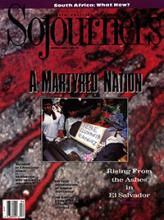For years the peace movement has pointed out that each federal dollar can only be spent once, and that dollars spent on arms are not available to fulfill human needs. It is a truism that we cannot have guns and butter; textbooks in college economics include graphs that show their inverse ratio. The argument against peace conversion has not been that we could have both; it has been that we needed the guns to defend ourselves against worldwide communism and therefore must do without the butter.
Recent events in the Soviet Union and Eastern Europe have led people in the United States to the obvious conclusion: It's time to spend more on butter, not guns. And there is no lack of ideas on how to spend such a "peace dividend."
The list is familiar--affordable housing, education, job and anti-poverty programs, health care, AIDS research. And it is widely recognized that the nation's infrastructure--roads, railways, waterways--are decaying and in need of immediate repair or replacement.
President Bush, however, is committed to balancing the federal budget and rolling back the $3 trillion national debt before using any peace dividend money to provide goods and services to the nation. "Some people seem to think that if you cut defense spending...we can take that money and spend it on something else," he said recently. "We can't do that. We've got enormous budget problems."
Read the Full Article
